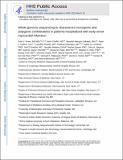| dc.contributor.author | Khera, Amit V. | |
| dc.contributor.author | Chaffin, Mark | |
| dc.contributor.author | Zekavat, Seyedeh Maryam | |
| dc.contributor.author | Roselli, Carolina | |
| dc.contributor.author | Natarajan, Pradeep | |
| dc.contributor.author | Kathiresan, Sekar | |
| dc.date.accessioned | 2020-04-15T20:46:57Z | |
| dc.date.available | 2020-04-15T20:46:57Z | |
| dc.date.issued | 2019-03 | |
| dc.identifier.issn | 0009-7322 | |
| dc.identifier.uri | https://hdl.handle.net/1721.1/124679 | |
| dc.description.abstract | Background: The relative prevalence and clinical importance of monogenic mutations related to familial hypercholesterolemia and of high polygenic score (cumulative impact of many common variants) pathways for early-onset myocardial infarction remain uncertain. Whole-genome sequencing enables simultaneous ascertainment of both monogenic mutations and polygenic score for each individual. Methods: We performed deep-coverage whole-genome sequencing of 2081 patients from 4 racial subgroups hospitalized in the United States with early-onset myocardial infarction (age ≤55 years) recruited with a 2:1 female-to-male enrollment design. We compared these genomes with those of 3761 population-based control subjects. We first identified individuals with a rare, monogenic mutation related to familial hypercholesterolemia. Second, we calculated a recently developed polygenic score of 6.6 million common DNA variants to quantify the cumulative susceptibility conferred by common variants. We defined high polygenic score as the top 5% of the control distribution because this cutoff has previously been shown to confer similar risk to that of familial hypercholesterolemia mutations. Results: The mean age of the 2081 patients presenting with early-onset myocardial infarction was 48 years, and 66% were female. A familial hypercholesterolemia mutation was present in 36 of these patients (1.7%) and was associated with a 3.8-fold (95% CI, 2.1-6.8; P<0.001) increased odds of myocardial infarction. Of the patients with early-onset myocardial infarction, 359 (17.3%) carried a high polygenic score, associated with a 3.7-fold (95% CI, 3.1-4.6; P<0.001) increased odds. Mean estimated untreated low-density lipoprotein cholesterol was 206 mg/dL in those with a familial hypercholesterolemia mutation, 132 mg/dL in those with high polygenic score, and 122 mg/dL in those in the remainder of the population. Although associated with increased risk in all racial groups, high polygenic score demonstrated the strongest association in white participants (P for heterogeneity=0.008). Conclusions: Both familial hypercholesterolemia mutations and high polygenic score are associated with a >3-fold increased odds of early-onset myocardial infarction. However, high polygenic score has a 10-fold higher prevalence among patients presents with early-onset myocardial infarction. Clinical Trial Registration: URL: https://www.clinicaltrials.gov. Unique identifier: NCT00597922. ©2019 | en_US |
| dc.description.sponsorship | National Institutes of Health (no. TR001100) | en_US |
| dc.description.sponsorship | American Heart Association (no. 17SDG33680041) | en_US |
| dc.description.sponsorship | National Human Genome Research Institute (no. 5UM1HG008895) | en_US |
| dc.language.iso | en | |
| dc.publisher | Ovid Technologies (Wolters Kluwer Health) | en_US |
| dc.relation.isversionof | 10.1161/CIRCULATIONAHA.118.035658 | en_US |
| dc.rights | Creative Commons Attribution-Noncommercial-Share Alike | en_US |
| dc.rights.uri | http://creativecommons.org/licenses/by-nc-sa/4.0/ | en_US |
| dc.source | PMC | en_US |
| dc.title | Whole-genome sequencing to characterize monogenic and polygenic contributions in patients hospitalized with early-onset myocardial infarction | en_US |
| dc.type | Article | en_US |
| dc.identifier.citation | Khera, Amit V., et al., "Whole-genome sequencing to characterize monogenic and polygenic contributions in patients hospitalized with early-onset myocardial infarction." Circulation 139, 13 (March 2019): p. 1593-1602 doi 10.1161/CIRCULATIONAHA.118.035658 ©2019 Author(s) | en_US |
| dc.contributor.department | Broad Institute of MIT and Harvard | en_US |
| dc.relation.journal | Circulation | en_US |
| dc.eprint.version | Author's final manuscript | en_US |
| dc.type.uri | http://purl.org/eprint/type/JournalArticle | en_US |
| eprint.status | http://purl.org/eprint/status/PeerReviewed | en_US |
| dc.date.updated | 2020-04-06T16:34:57Z | |
| dspace.orderedauthors | Khera, Amit V. ; Chaffin, Mark ; Zekavat, Seyedeh Maryam ; Collins, Ryan L. ; Roselli, Carolina ; Natarajan, Pradeep ; Lichtman, Judith H. ; D’Onofrio, Gail ; Mattera, Jennifer ; Dreyer, Rachel ; Spertus, John A. ; Taylor, Kent D. ; Psaty, Bruce M. ; Rich, Stephen S. ; Post, Wendy ; Gupta, Namrata ; Gabriel, Stacey ; Lander, Eric ; Chen, Yii-Der Ida ; Talkowski, Michael E. ; Rotter, Jerome I. ; Krumholz, Harlan M. ; Kathiresan, Sekar | en_US |
| dspace.date.submission | 2020-04-06T16:34:59Z | |
| mit.journal.volume | 139 | en_US |
| mit.journal.issue | 13 | en_US |
| mit.license | PUBLISHER_POLICY | |
| mit.metadata.status | Complete | |
